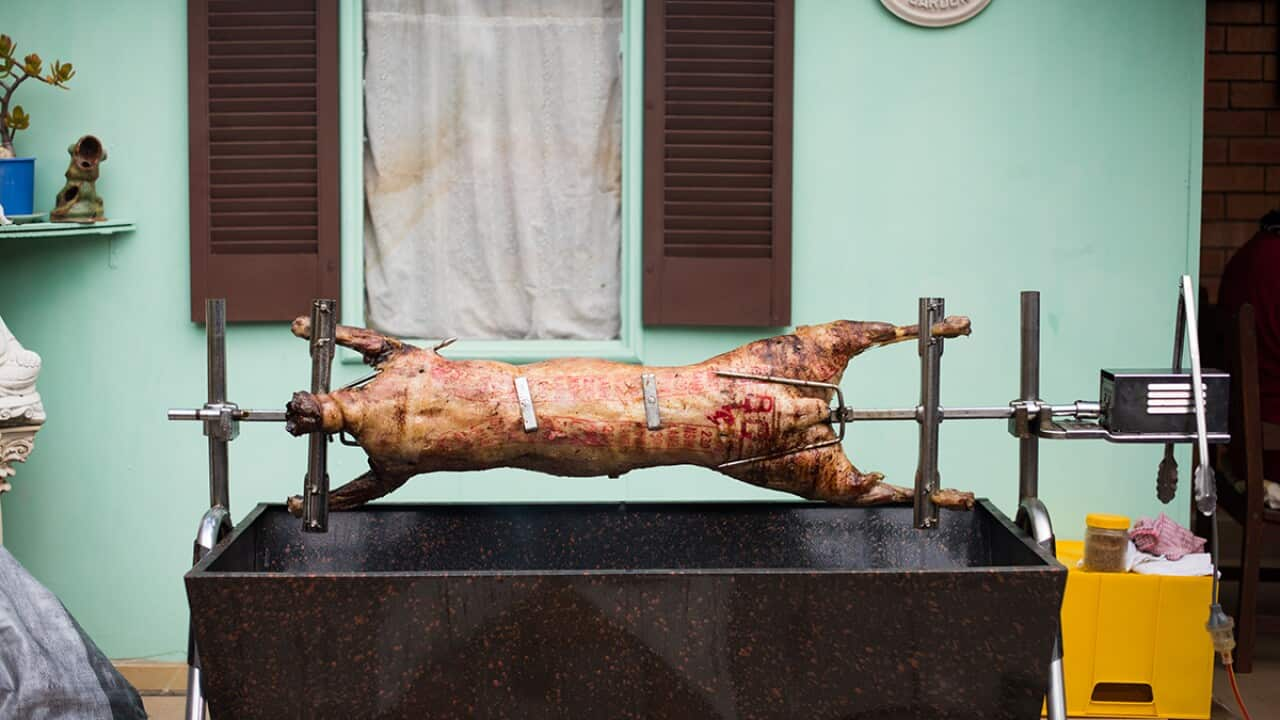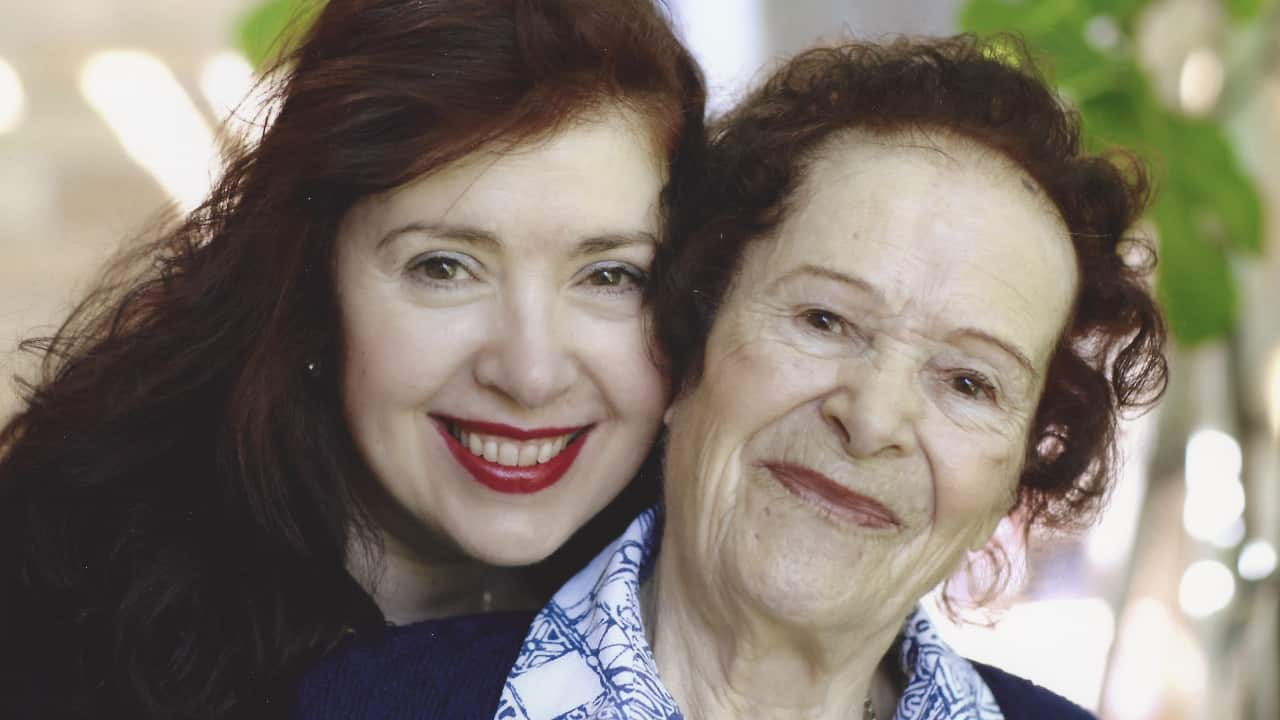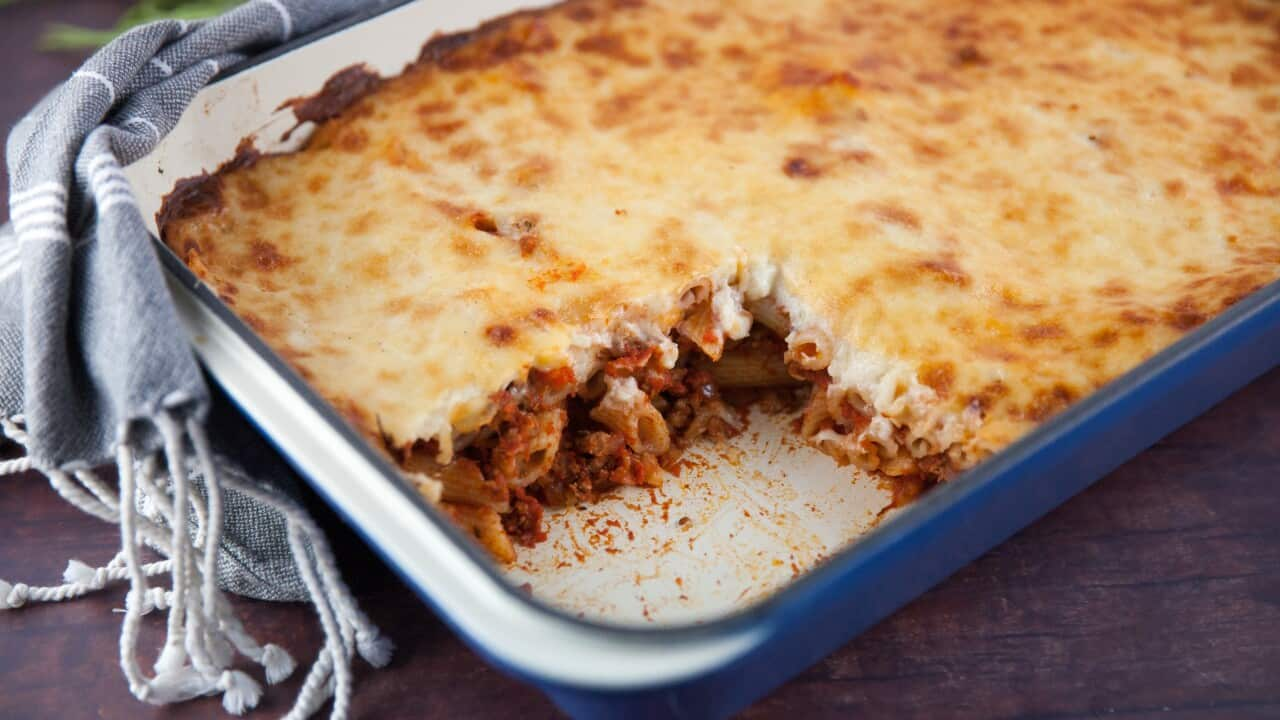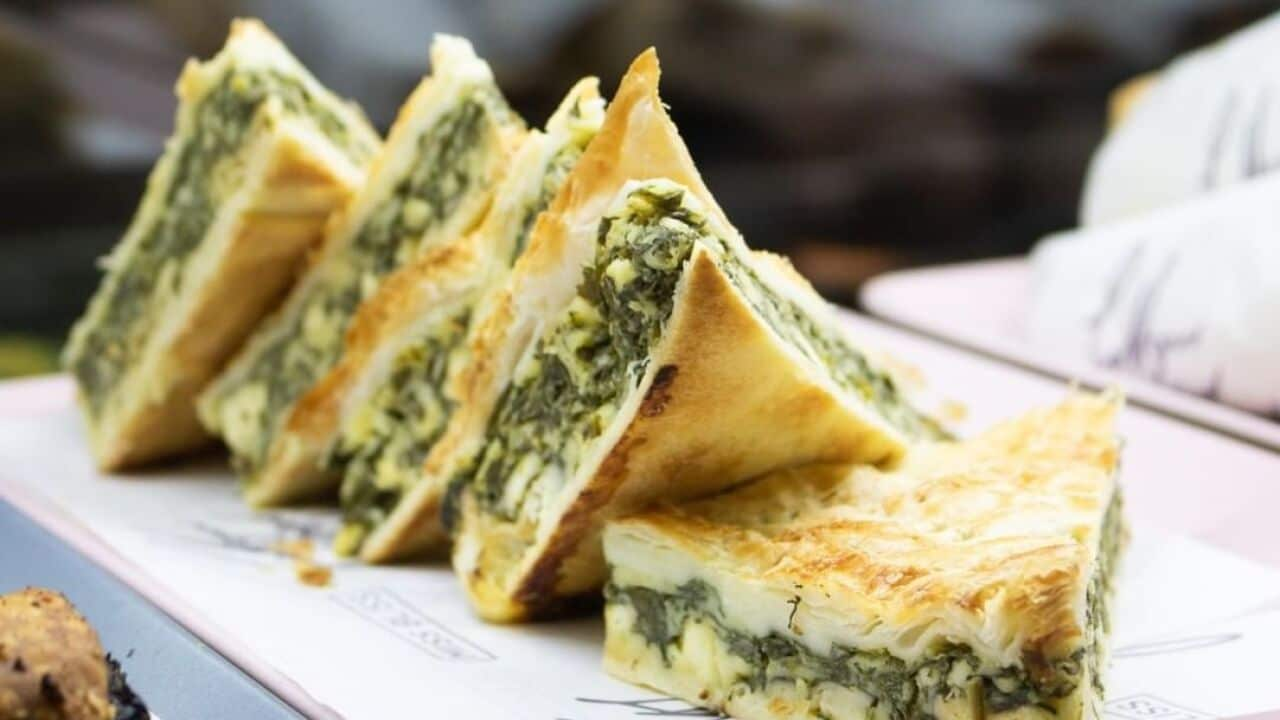Like many Greeks, Stokes' parents migrated to Australia seeking a better life. Her dad Panayiotis arrived in 1955 at age 34 by boat while her mum Vasiliki arrived in 1961 at 29 on a British Airways plane. They both came out on their own to escape hardships in Greece after WWII but especially following the Greek Civil War.
Of the few possessions they could bring with them, they brought Greek food traditions — including Orthodox Easter Passover, known in Greek as Pascha.
Stokes' parents met through the Greek community in Marrickville and married in 1962, raising four children in a traditional Greek household. Her mum Vasiliki was her family's main cook, except when it came to barbecues.
Stokes tells SBS Food, "Panayiotis, my dad, is known among the family as the 'barbecue king' because he could cook a mean lamb chop and a tasty chicken wing over coals or timber anytime."
A traditional Easter Sunday dish that her family called souvla involves a whole lamb slowly roasted on a spit, which was naturally Panayiotis' dominion. He would prep the lamb the day before, poking slits in it and stuffing it with lumps of garlic and little rosemary twigs. Then, he would season it with salt and pepper and rub the lamb all over to tenderise it. Overnight, he would lay it gently in an empty bathtub before he covered it with ice and a tarp.
"On Easter Sunday morning, at the crack of dawn, while we all slept, he would quietly go out the back and start the fire," Stokes remembers.
"It was an open fire, with lots of timber, coal and newspaper in a secluded area surrounded by corrugated iron walls and a frame set up ready to assemble the lamb on the make-shift rotisserie.
"Once the fire was ready, he would place the lamb on the rotisserie and start turning and turning and turning. Thank goodness for the guy who came up with the idea of a motorised spit you can now purchase." Stokes shares how as kids they loved to turn the lamb. "It was a challenge to turn that heavy carcass round and round, but what we were really waiting for was that first cut just above the hip where the juices would run out and the reveal of the pink flesh told us, 'it won't be long now!'"
Stokes shares how as kids they loved to turn the lamb. "It was a challenge to turn that heavy carcass round and round, but what we were really waiting for was that first cut just above the hip where the juices would run out and the reveal of the pink flesh told us, 'it won't be long now!'"

Sophie's dad barbecued the lamb on a spit for Greek Easter. Source: Supplied
Panayiotis made a concoction of lemon juice, garlic, olive oil and herbs to brush over the lamb as it cooked. This was the secret — it kept the meat from drying out and the tang was out of this world.
LAMB ON A SPIT RECIPE

Spit-roasted lamb
Easter baking during Holy week
During Stokes' childhood, her mum would prepare food throughout the Holy week. "Leading up to our lunchtime family feast on Easter Sunday, beginning Holy week, mum would start kneading dough and baking all her Greek sweets, including , and customary Greek butter cookies covered in icing sugar called kourabiedes. Then, she would move on to the savoury dishes later in the week," Stokes says.
"The aromas are what I remember. All week, they were wafting through our home, an indication that the biggest and most treasured holiday celebration in the Greek calendar is nearly here and we were all filled with excitement and great anticipation," she adds.
The aromas are what I remember. All week, they were wafting through our home, an indication that the biggest and most treasured holiday celebration in the Greek calendar is nearly here.
Stokes fondly remembers her parents' arguments about whether they should use butter or oil in a particular dish.
"My dad came from Central Greece where they used a lot of butter for their cooking. My mum came from Southern Greece where they used a lot of olive oil for their cooking. Sometimes we'd get two versions of the one dish…just to keep the peace."
During this time, Stokes joined her mum in the kitchen where she learned Greek cooking, partly by watching and partly through undertaking simple tasks like braiding the tsoureki dough and painting the red Easter eggs. On Holy Thursday, Vasiliki dyed dozens of eggs, which are typically the first food that people observing Greek Easter eat to break the 40-day fasting of Lent, right after midnight mass on Easter Saturday.
On Holy Thursday, Vasiliki dyed dozens of eggs, which are typically the first food that people observing Greek Easter eat to break the 40-day fasting of Lent, right after midnight mass on Easter Saturday.

Sophie Stokes has always loved to be in kitchen where she learned a lot about cooking from her mum. Source: Supplied
"As children, we would fast during lent and go without meat for 40 days, but as we got older and integrated into Australian culture mostly through school, we set that tradition aside and no one in the family till this day fasts, but it would in hindsight be a great tradition to pick up again," Stokes says.
The eggs also formed part of the Easter Sunday spread. They were eaten and used to play a game called tsougrisma.
"To play the tsougrisma, we each hold a hard-boiled egg in the palm of our hand and one player taps the egg of another player. The aim of the game is to be the last player standing without a cracked egg. The winner carries the title for the following year and with that goes the privilege of a year filled with 'good luck'," she explains.
How traditional moussaka turned vegetarian
Stokes says that her family dish is without a doubt the lamb on a spit, but alongside that is her all-time favourite, vegetarian moussaka made with chickpeas.
Initially, her family ate the conventional moussaka, which featured meat. But in 2014, Stokes decided to be vegan for a year. During that time, she converted many Mediterranean dishes to plant-based ones and that's how the chickpea moussaka became a new plate at their Easter spread.
There are many vegetarian moussakas out there, but not as yet have I seen any with chickpeas. Even my mum loves it.
"This dish is a crowd-pleaser for sure, even for meat-eaters. There are many vegetarian moussakas out there, but not as yet have I seen any with chickpeas. Even my mum loves it and has converted to making it with chickpeas, which is a testament to how great it really is."
Adding to their Easter menu are , , roasted lemon and oregano potatoes with bowls of to go with the succulent lamb. Then comes the freshly baked dripping in a honey syrup, , and biscuits.
Passing on Easter family food traditions
In 1984, Stokes married Australian-born Greg at the age of 19. He was very keen to learn Greek food culture and helps carry the traditions forward.
"Greg learnt very quickly how to prepare a lamb on the spit. My dad taught him everything he knows, from readying the lamb to making the basting, and to get that right amount of seasoning rubbed all over the lamb," Stokes says.
"To our delight, the last few years Greg's had a wonderful opportunity to teach our three sons-in-law how to continue this tradition, so each year we can come together, taking turns in each other's homes to celebrate the best family holiday on the Greek calendar."
Like Stokes and her mum, her own three daughters, Jessica, Jasmin and Melanie, also join her in the kitchen.
"Now as mothers with their own children, each year, the family gathers in my home, and together, with blasting Greek music in the background, we bake all the Greek sweets and bread for Easter day, dye our eggs red and create beautiful memories that my grandchildren can now start to be a part of. And true to tradition in the evening the guys take care of preparing the lamb." Stokes now shares her cooking with a wider audience. In 2016, she published her first cookbook called In Sofia's Kitchen: Mediterranean Flavours Down Under. She also offers food tours to Crete, an island in Greece (when possible) and across Australia.
Stokes now shares her cooking with a wider audience. In 2016, she published her first cookbook called In Sofia's Kitchen: Mediterranean Flavours Down Under. She also offers food tours to Crete, an island in Greece (when possible) and across Australia.

Sophie's family invite their friends to join their Greek Easter celebrations. Source: Supplied
Stokes loves sharing food in her neighbourhood of Newcastle in NSW too. "We always invite a number of our non-Greek friends and neighbours to come to join us for the Sunday feast.
"It's nothing for us to have 40 plus guests in our home enjoying the food. Greek 'philoxenia', our [hospitality] at its best. This is definitely a tradition worth celebrating and continuing for all generations."
Vegetarian chickpea moussaka
Ingredients
Tomato sauce
- 2 tbsp olive oil
- 1 leek, thinly sliced
- 3 garlic cloves, minced
- 1 tsp ground cumin
- 2 tsp paprika
- 1 tsp ground cinnamon
- 700 g tomato passata
- 1 tbsp tomato paste
- 2 cups cooked chickpeas
- ½ cup fresh Italian parsley, chopped
- ½ cup fresh basil, chopped
- 250 ml vegetable stock
- Salt and pepper, to taste
- 2 eggs, lightly beaten
Eggplant and potato layer
- 2 eggplants
- 4 medium potatoes, diced into 2 cm cubes
- ¼ cup olive oil
- 100 g feta, crumbled
- ½ cup fresh Italian parsley, chopped
- Salt and pepper, to taste
Bechamel sauce
- 125 g unsalted butter, chopped into cubes
- ½ cup plain flour
- 3 cups milk
- ½ cup grated parmesan cheese
- Parmesan cheese, extra
- 2 egg yolks
- ½ tsp ground nutmeg
Method
Tomato Sauce
- Lightly sauté leek and garlic in olive oil. Add spices stirring for 5 minutes to flavour leek and garlic.
- Add tomato passata, tomato paste, chickpeas, fresh herbs and vegetable stock. Stir until combined and bring to boil.
- Reduce heat, cover and simmer for 30 minutes. Season.
- When cool, add eggs and stir through.
Eggplant layer
- Preheat oven to 180*C. Dice and salt eggplants and leave aside in a colander for 30 minutes. Rinse and pat dry.
- Heat oil in a shallow frying pan on medium heat. Add potatoes and cook till golden brown. Remove and drain on absorbent paper. Place in a lightly oiled medium-size baking dish (30cm x 20cm).
- Add eggplants to frypan and cook until golden brown. Remove and drain on absorbent paper. Place eggplants on top of potatoes.
- Crumble feta on top and sprinkle with parsley. Season.
- Pour cooked tomato sauce on top.
Bechamel Sauce
- In a medium saucepan, melt butter. Add flour; stir to combine.
- Gradually add milk, whisking out any lumps that form. Keep whisking until the mixture boils and thickens. Remove from heat.
- Add egg yolks, parmesan and nutmeg. Stir until combined.
- Pour bechamel over tomato sauce.
- Sprinkle extra parmesan and nutmeg on top and bake in the oven for 40–45 minutes or until golden.







